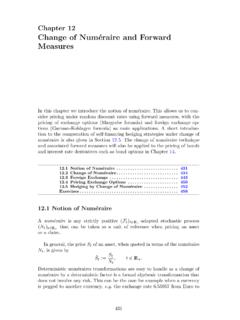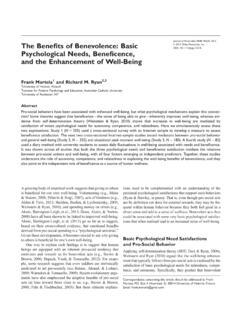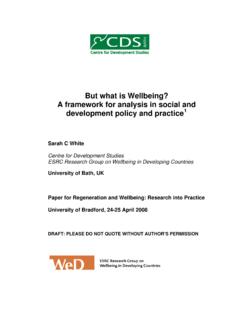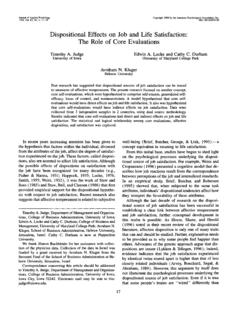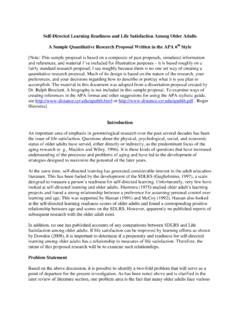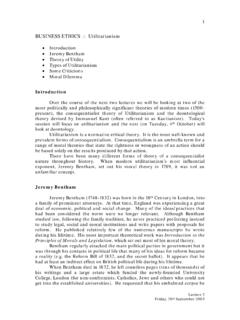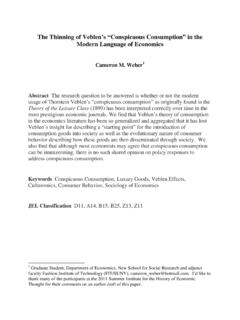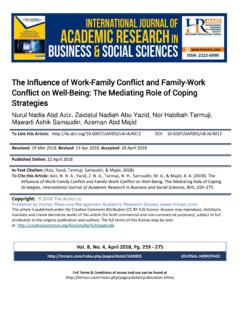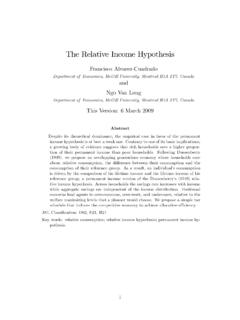Transcription of Happiness, Life Satisfaction, or Subjective Well Being
1 1 happiness , life satisfaction , or Subjective well - Being ? A Measurement and Moral Philosophical Perspective Yew-Kwang Ng Winsemius Professor, Division of Economics, Nanyang Technological University, 14 Nanyang Drive, Singapore 637332. Phone: 65-67906785; email: ABSTRACT. While not denying the usefulness of different concepts like life satisfaction and Subjective well - Being , this paper argues that happiness should be preferred in most cases, particularly with respect to what individuals and the society should really be interested in ultimately.
2 life satisfaction is more liable to a shift in the aspiration level, reducing the comparability of the resulting indices. life satisfaction and/or preference may also differ from happiness due to a concern for the happiness of others. A moral philosophical argument in favour of happiness as the only rational ultimate objective is given. All proposed qualifications to this principle can be explained by the effects on the happiness in the future or of others (hence really no qualification) or that their apparent acceptability is due to our imperfect rationality.
3 Simple ways to improve the accuracy and interpersonal and intertemporal comparability of happiness measurement include using happiness instead of life satisfaction (or other concepts), pinning down the dividing line of the zero amount of net happiness , using an interpersonally valid unit based on the just perceivable increment of happiness , and the complementary use of this method for small samples and the traditional methods for large samples. KEY WORDS: happiness ; life satisfaction ; Subjective well - Being ; measurement; interpersonal comparability; moral philosophy.
4 2 In the past decade or so, happiness studies have made significant advances, including many new and significant findings, much more interdisciplinary interest (including from economists), and much more attention in the mass media. These are to be welcome. happiness (for oneself or for others) is the ultimate objective of rational individuals. We make money in order to buy goods; we consume goods to stay alive and to enjoy life ; we enjoy life to get happiness ; we want happiness for its own sake. It is the ultimate end; it is valuable in itself.
5 It is true that Being happy may also make us healthier or may even make us earn more money. However, Being healthier and Being wealthier are ultimately valuable to us only if they give us more happiness . happiness also has an important place in the moral philosophical literature. Despite (or is it because of) centuries of controversy, new concepts of and arguments on happiness are forthcoming. For example, Sumner (1996) advance an authentic (informed and autonomous) happiness theory of well - Being that is still hotly debated recently ( Bognar 2010, Tupa 2010, Petersen & Ryberg 2014).
6 However, the concept of happiness used is attitudinal , and is less misleadingly termed life satisfaction . Feldman (2004) advances an intrinsic attitudinal hedonism theory of the good life . The intrinsic vs. extrinsic distinction (see Blackson 2010 for a discussion) becomes irrelevant if we dispense with the attitudinal requirement and go for happiness in the sense of feeling rather than life satisfaction , as argued in this present paper. The estimation/measurement of happiness in practice is done mainly by survey/interview of the relevant individuals or a sample of them.
7 Somewhat different concepts have been used, roughly falling into three groups: happiness , life satisfaction , and Subjective well - Being . We are not concerned here with more objective indices such as quality-of- life (QOL) indicators ( Ventegodt 1996). As emphasized by Hajiran (2006, ), Improving QOL is just a means and not an end in itself. The ultimate goal of improving QOL is to maintain and enhance the scope, depth and intensity of human well - Being or happiness .1 While not denying the usefulness of different concepts, this paper argues that happiness should be preferred in most cases and particularly with respect to what individuals and the society should really be interested in ultimately.
8 This is related to normative valuation and different persons may have different views. It is difficult if not impossible to have full agreement here. Nevertheless, hopefully some useful views may have been advanced. Section 1 discusses the meanings of the various concepts and why happiness should be preferred. Section 2 discusses why public policy should aim for happiness . Section 3 discusses how the measurement of happiness could be improved, especially in terms of interpersonal and intertemporal comparability. The lack in comparability in existing happiness measures makes happiness studies vulnerable to the criticism of doubters of happiness results such as Johns & Ormerod (2007; reviewed by Ott 2010).
9 If happiness measures could be based on more 3 comparable methods of measurement, less controversies and misunderstandings may be forthcoming. 1. happiness , life satisfaction , and Subjective well - Being : Meanings and Differences At any moment in time, an individual may be happy, unhappy, or Being neutral (including Being unconscious, as during dreamless sleep). Here, Being happy or unhappy is interpreted in the wide sense to include not only sensuous pleasures and pains, but also spiritual fulfilment and mental sufferings.
10 All affective feelings that the individual enjoy or suffer from are included. Of course, enjoyment or suffering may have different degrees of intensity. In Figure 1, the degree of intensity is measured in the vertical axis (with higher degree of enjoyment or happiness Being further up and away from the origin of neutrality and higher degree of suffering or unhappiness Being further down and away from the origin of neutrality) and time is measured on the horizontal axis. The degrees of positive or negative affective feelings of an individual over a given period of time may be represented by a curve such as the one in Figure 1.









